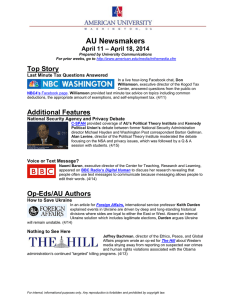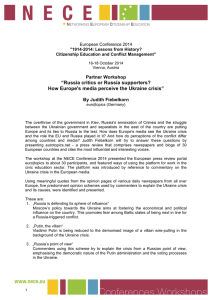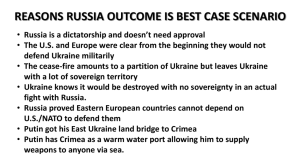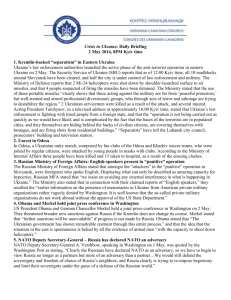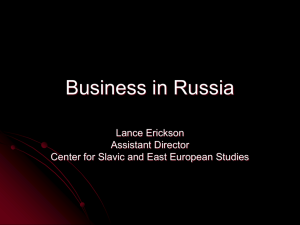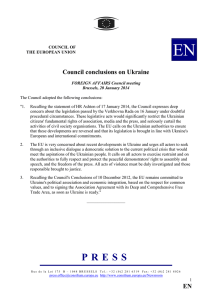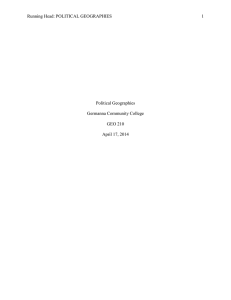AU Newsmakers Top Story – March 7, 2014 February 28
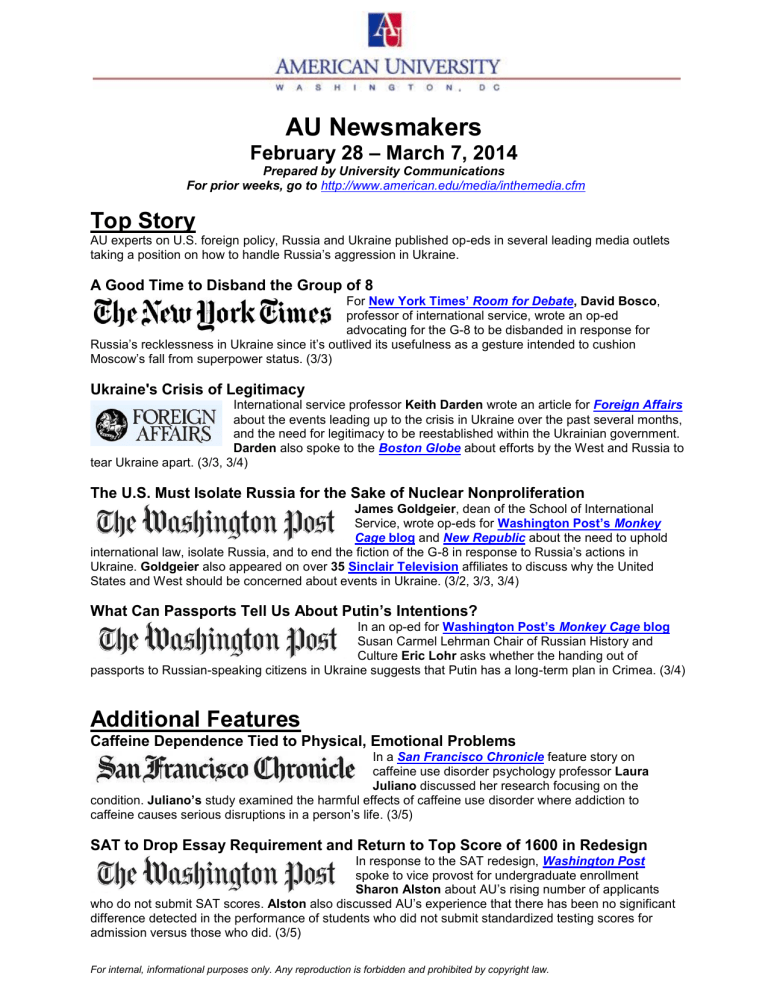
AU Newsmakers
February 28
– March 7, 2014
Prepared by University Communications
For prior weeks, go to http://www.american.edu/media/inthemedia.cfm
Top Story
AU experts on U.S. foreign policy, Russia and Ukraine published op-eds in several leading media outlets taking a position on how to handle Russia’s aggression in Ukraine.
A Good Time to Disband the Group of 8
For New York Times’ Room for Debate , David Bosco , professor of international service, wrote an op-ed advocating for the G-8 to be disbanded in response for
Russia’s recklessness in Ukraine since it’s outlived its usefulness as a gesture intended to cushion
Moscow’s fall from superpower status. (3/3)
Ukraine's Crisis of Legitimacy
International service professor Keith Darden wrote an article for Foreign Affairs about the events leading up to the crisis in Ukraine over the past several months, and the need for legitimacy to be reestablished within the Ukrainian government.
Darden also spoke to the Boston Globe about efforts by the West and Russia to tear Ukraine apart. (3/3, 3/4)
The U.S. Must Isolate Russia for the Sake of Nuclear Nonproliferation
James Goldgeier , dean of the School of International
Service, wrote op-eds for Washington Post’s Monkey
Cage blog and New Republic about the need to uphold international law, isolate Russia, and to end the fiction of the G8 in response to Russia’s actions in
Ukraine. Goldgeier also appeared on over 35 Sinclair Television affiliates to discuss why the United
States and West should be concerned about events in Ukraine. (3/2, 3/3, 3/4)
What Can Passports Tell Us About Putin’s Intentions?
In an op-ed for Washington Post’s Monkey Cage blog
Susan Carmel Lehrman Chair of Russian History and
Culture Eric Lohr asks whether the handing out of passports to Russian-speaking citizens in Ukraine suggests that Putin has a long-term plan in Crimea. (3/4)
Additional Features
Caffeine Dependence Tied to Physical, Emotional Problems
In a San Francisco Chronicle feature story on caffeine use disorder psychology professor Laura
Juliano discussed her research focusing on the condition. Juliano’s study examined the harmful effects of caffeine use disorder where addiction to caffeine causes serious disruptions in a person’s life. (3/5)
SAT to Drop Essay Requirement and Return to Top Score of 1600 in Redesign
In response to the SAT redesign, Washington Post spoke to vice provost for undergraduate enrollment
Sharon Alston about AU’s rising number of applicants who do not submit SAT scores. Alston also discussed AU’s experience that there has been no significant difference detected in the performance of students who did not submit standardized testing scores for admission versus those who did. (3/5)
For internal, informational purposes only. Any reproduction is forbidden and prohibited by copyright law.
Op-Eds/AU Authors
Five Things You Should Know About the Netflix-Comcast Deal
Communication professor Laura DeNardis in her article appearing in Slate.com
explains why the Comcast-Netflix deal poses little danger to net neutrality while arguing for greater transparency in how the Internet operates. (2/28)
Expertise
Former Ala. Prison Inmates Describe Abuse
Law professor Brenda V.Smith
spoke to Associated Press about female inmate abuse and serious misconduct at
Alabama’s Julia Tutweiler Prison for Women. More than 45 outlets, including Washington Post , ABCNews.com
and
Yahoo.com
republished this article. (3/2)
Russia's U.S. PR Firm Distances Itself From Ukraine Dispute
Kogod executive in residence Michael Carberry spoke to Reuters about how U.S. public relations company Ketchum Inc. has backed away from advising the Russian Federation in light of actions taken in
Ukraine. (3/6)
Beware the Stealth Tax
With Wall Street Journal , David Kautter , executive director of the Kogod Tax Center, talked about the Alternative Minimum Tax and exemption traps posed to those affected by the AMT. (2/28)
Nutrition Label Changes
Anastasia Snelling, associate dean of the School of Education, Teaching and
Health, appeared on C-SPAN's Washington Journal to discuss federal changes to food nutrition fact labels and the impetus to improve consumers' opportunities for healthy eating.
(3/2)
In Drafting a Presidential Budget, Cost May Outweigh Benefit
With NPR’s Weekend Edition Sunday , James Thurber director of the
Center for Congressional and Presidential Studies explained the diminishing influence the presidential budget has on Capitol Hill as a result of the independent Congressional Budget Office and mandatory spending which have reduced the impact of the president’s budget proposal since the 1970s. (3/2)
Military Budget Marks A Major Shift — Why This, Why Now?
International service professor Gordon Adams appeared on NPR’s All
Things Considered to discuss the cuts in the U.S. defense budget and future role of the U.S. military. (3/5)
Cold War II? Obama Legacy Hangs on Russia
Anton Fedyashin , director of the Initiative for Russian Culture, talked to McClatchy Newspapers about how the failed ‘reset’ between the United States and Russia, which was meant to improve relations between the two countries, was an unrealistic goal. (3/2)
For internal, informational purposes only. Any reproduction is forbidden and prohibited by copyright law.
No More Formaldehyde Baby Shampoo
With Slate.com
, chemistry professor Matthew Hartings discussed the toxicity levels of formaldehyde that are found in everyday products such as baby shampoo. (3/3)
Nigeria Struggles With Surging Boko Haram Violence
International service professor Carl LeVan spoke to Voice of America TV about international efforts in Nigeria to counter Boko Haram militants. LeVan also explained that social inequities in Nigeria need attention. (3/3)
For internal, informational purposes only. Any reproduction is forbidden and prohibited by copyright law.


